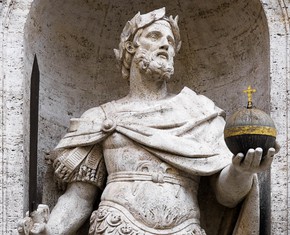The views expressed in our content reflect individual perspectives and do not represent the authoritative views of the Baha'i Faith.
Do we all worship the same God? Yes, the Baha’i teachings unequivocally say. Despite our linguistic, cultural and historical differences, everyone is equal in the sight of one God.
No matter what Faith we follow or what we call the Creator, the same God hears all our prayers.
Baha’u’llah explained that the creation is separate from the Creator. However, the Baha’i teachings point out, throughout all of creation the traces of God’s work exist. The majestic swirl of the stars and planets of our galaxy and the very atoms that compose them reflect the awesome and awe-inspiring workmanship of the Creator:
All praise to the unity of God, and all honor to Him, the sovereign Lord, the incomparable and all-glorious Ruler of the universe, Who, out of utter nothingness, hath created the reality of all things, Who, from naught, hath brought into being the most refined and subtle elements of His creation, and Who, rescuing His creatures from the abasement of remoteness and the perils of ultimate extinction, hath received them into His kingdom of incorruptible glory. Nothing short of His all-encompassing grace, His all-pervading mercy, could have possibly achieved it. …
Having created the world and all that liveth and moveth therein, He, through the direct operation of His unconstrained and sovereign Will, chose to confer upon man the unique distinction and capacity to know Him and to love Him – a capacity that must needs be regarded as the generating impulse and the primary purpose underlying the whole of creation …. – Baha’u’llah, Gleanings from the Writings of Baha’u’llah, pp. 64-65.
The Baha’i writings say that the existence of the universe and the dynamic processes which govern the appearance of life itself prove that it all emanated from the Divine Will. God created not only the complex physical interaction of forces seen at work in nature, but also the more subtle planes of existence, dimensions unseen by human eyes, whose existence lies beyond the perception of senses and mind, a non-physical cosmos which interacts with our spiritual nature. These multiple dimensions constitute a greater reality than just the physical universe:
He is really a believer in the Unity of God who recognizes in each and every created thing the sign of the revelation of Him Who is the Eternal Truth, and not he who maintaineth that the creature is indistinguishable from the Creator. – Baha’u’llah, Gleanings from the Writings of Baha’u’llah, p. 189.
For the individual, Baha’u’llah taught that the purpose of our creation is to know and love God:
Know that thy true adornment consisteth in the love of God and in thy detachment from all save Him, and not in the luxuries thou dost possess. Abandon them unto those who seek after them and turn unto God, He Who causeth the rivers to flow. – Baha’u’llah, The Summons of the Lord of Hosts, p. 61.
But how can we know God if God is unknowable? Throughout the Baha’i teachings, God is spoken of in attributes rather than descriptions: the All-Knowing, the All-Wise, the Ever-Forgiving, the Most Generous, the Almighty, the All-Glorious, the Most-Bountiful, etc.
These divine qualities are expressed in words whose basic meanings lie within the grasp of human understanding, but which can only be alluded to within the limits of language – since we can never evolve a spiritual vocabulary adequate to describe the attributes of God. The use of these attributive terms within the writings of Baha’u’llah clearly demonstrates that God is beyond the notions of shape and form, above the concepts of race and gender.
This existence is without location or condition, an unknowable essence which cannot be made anthropomorphic. Therefore, God is not a bearded old man being held aloft by a host of angels as portrayed by Michelangelo; God is not a star-covered nude woman arching over the earth as in Egyptian iconography; God is not any image fashioned with a round, radiant, flaming or triangular halo. God is not a lot of things. God is not created in our image or any symbolic image we have created in the past. God is what God is – yet the teachings of many Faiths tell us we are created in the likeness of God.
Baha’u’llah teaches us that the ethereal part of us, our spiritual reality, reflects this Divine image.
In other words, humans are essentially spiritual beings with outward bodies which change shape and size throughout the course of our lives, but whose inner being remains unaffected and continues to progress regardless of the condition of the physical vehicle which contains it. Collectively as a species, human beings have always been endowed with souls and the potential to acknowledge the existence of our Creator, regardless of the particular form our bodies have assumed throughout the continuum of our material existence. We are soul-bearing entities whose raison d’étre has always been to know and love God:
The purpose of God in creating man hath been, and will ever be, to enable him to know his Creator and to attain His Presence. To this most excellent aim, this supreme objective, all the heavenly Books and the divinely-revealed and weighty Scriptures unequivocally bear witness. – Baha’u’llah, Gleanings from the Writings of Baha’u’llah, p. 70.
The lifespan of our physical existence is infinitesimal when compared to the infinite expanse and duration of the universe around us; our life here on Earth is but a fleeting moment and only a small part of the reason why God created us.
Knowing and loving God, Baha’u’llah taught, forms an eternal process which continues after this physical life. Within each of us there exists a spiritual aspect perfectly suited to that eternal process; a deathless reality, part of an unseen spiritual dimension. The entire physical universe is encompassed and pervaded by this spiritual dimension, an infinity within an infinity.
This series of essays is adapted from Joseph Roy Sheppherd’s book The Elements of the Baha’i Faith, with permission from his widow Jan Sheppherd.
















Comments
Sign in or create an account
Continue with Googleor